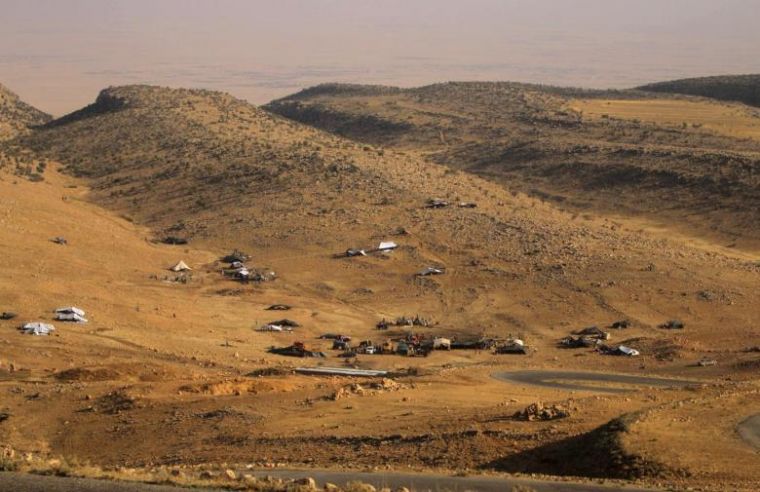Following Christ to show love to our neighbours
When I travelled to northern Iraq last year, I had the opportunity to meet with Christians and Yazidis whose lives have been devastated by the violence IS has wrought in the region. It was a humbling experience. Both communities were singled out by IS because of their religion or belief, and have experienced the most unspeakable violence.
As I reflect on the people I met on that visit, and the heart-breaking stories I heard, I am compelled to stand with and speak up for each of them, regardless of their creed.
Why? Simply put, because I believe it's what Jesus would do.
When we look deeply into the parable of the Good Samaritan, we are confronted by a picture of radical love for those in need.

It's a picture that lays a weighty, and sometimes challenging calling on us if we are to love our neighbour as Jesus teaches. We are presented not only with a command to 'be nice' to those around us, or a religious and moral obligation to do good unto others, but also with a compelling and Christ-like calling to transcend conventions and expectations by showing love to those who aren't 'like us'.
Our neighbour, as Jesus so clearly shows us, is the person who doesn't look or think like us, and may believe differently from us – and at times, someone with whom we may not agree. Societal conventions and cultural norms are swept aside by Jesus when he tells us to love our neighbour.
In the parable, those sharing the victim's religious and ethnic background pass him by in his moment of greatest need. Instead he was helped by someone from a totally dissimilar background who the victim and his community would ordinarily actively avoid, yet who went out of his way to care for him. We can never tell who God will send to help those in need, and we need to be ready to answer that call.
At CSW, we are doing just that.
We believe no one should suffer discrimination, harassment or persecution because of their religion, belief or non-belief. As Christians we stand with everyone facing injustice because of their religion or belief.
It's a weighty calling, not without its challenges, but one that we are privileged to answer.
Last year I visited Sinjar region where, in 2014, almost 10,000 Yazidis were killed or kidnapped when IS advanced on the region, in what has been officially recognised by the United Nations as a genocide.
As we approached Sinjar city, I saw clothes strewn across the mountainside. Our guide explained that when IS advanced on Sinjar, people fled, discarding their belongings as they did so. Those who survived are now living in harsh conditions in tents in a valley at the very top of the mountain range. They have nothing left – and many have lost all hope.
Sinjar city, which was also home to a large Christian community and two churches, was razed to the ground. We walked around what was left of the city. It is a ghost town. You could still see human bones and feel the suffering in the air.
Firouz, a 27-year-old Yazidi, and his family were living in Sinjar when IS advanced on the city. The family was forced to flee, taking only a few belongings and their personal weapons. Knowing what would happen to them at the hands of IS, the entire family agreed that the men would shoot the women and keep the last bullets for themselves if they were captured. As they fled, Firouz's youngest sisters begged him to shoot her. He promised he would. But before he could follow through with his promise, they were stopped at a mobile IS checkpoint. Knowing their fate if IS discovered they were Yazidis, the family pretended to be Muslim when the interrogations began. Suddenly Peshmerga fighters started firing heavily at IS, and when told to move their car, Firouz drove off quickly with IS fighters shooting at them. Unlike many others, they escaped unharmed.
For the Christian and Yazidi women captured by IS, unspeakable horrors awaited.
My heart was broken when I met Maryam and heard her story. Maryam, an Assyrian Orthodox Christian from a neighbourhood near Mosul, was captured by IS when they took Mosul in 2014. She told us she'd been sold 16 times in Iraq and six times in Syria. She recalled her traumatic experiences in detail: how she was tied to a pole in the street for people to inspect her before they 'bought' her. She fought every person who tried to violate her. Eventually Maryam was helped to escape, but when she returned home she was rejected by her family, and even by her church, for, in their eyes, bringing shame on them because of what had happened to her.
In the work that we do at CSW, we tackle injustice and suffering, and we promote the right to practise a religion or belief freely, without fear of being targeted because of it. We 'speak up for those who cannot speak for themselves, for the rights of all who are destitute'. We 'speak up and judge fairly; defending the rights of the poor and needy.'
If we are to follow in the footsteps of Jesus, we must not stand by silently in the face of such suffering. As the parable of the Good Samaritan teaches, the Yazidis are as much our neighbours as Maryam is.
We will cross the road to help them both.
Mervyn Thomas is the founder and chief executive of Christian Solidarity Worldwide, a Christian human rights organisations advocating for freedom of religion or belief around the world.
International Freedom of Religion or Belief Day is on October 27.











